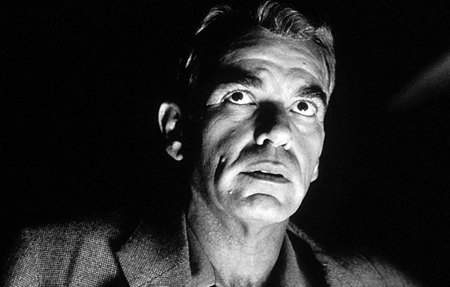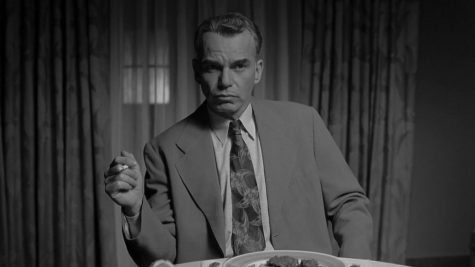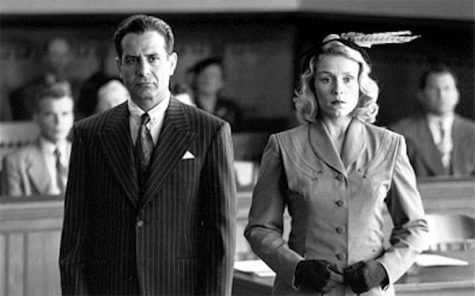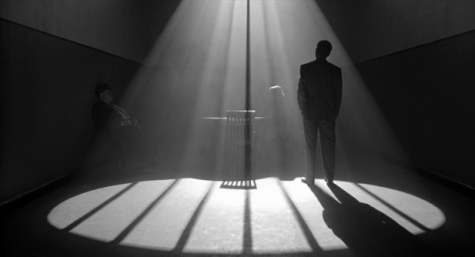
Reel Reviews – The Man Who Wasn’t There
December 13, 2018
Alfred Hitchcock is famous for stories such as: The Birds (1963), Psycho (1960), and Rear Window (1954). One can easily remember his name when they see his unique, fear-inducing style that set the audience into a state of anxiety for decades. One aspect that contributes to this is his visuals. He always had an eye for horror through deep contrast and dark tones. If one were to best describe them in one word, they would be suspicious — just dark enough to have that sense of uncertainty that leaves you on edge. Could something happen? Maybe. Or Maybe not. Perhaps the true horror itself is feeling the familiar unease of daily life. That alley looks a bit dark, that man has been staring for a concerning amount of time, etc. Of course, this technique became a point of interest for many directors throughout the years, and soon found its way to the Coen Brothers in their 2001 film: The Man Who Wasn’t There.
Though not specifically labeled as a “horror” film, techniques derived from Hitchcock are seen left and right with that Coen Brother brilliance mixed in. The feeling of being uncertain was strong throughout the film– and necessarily so. With the perfect amount of twists and turns, I found myself loving it more by the scene. It reeled me in. And if there’s one thing I respect about a movie, it’s its ability to get my attention from the first scene.
The plot revolves around a barber as his simple life becomes somewhat of a complicated one when his unfaithful wife drives him into a frenzy of hate, blackmail, and murder. It starts with the soft sounds of Beethoven over a shot of a local barber shop – owned by Frank (Michael Badalucco) and his brother in law – our main character – Ed Crane (Billy Bob Thornton). The credits roll before narration from Crane fades in. He tells us of his story: how he got there and when. This theme continues for the rest – his voice cutting in to give insight or philosophical remarks in regards to his inner conflict.
I’ve mentioned in previous Reel Reviews that narration is tricky to use. It’s either great, or a mistake. Unsurprisingly, the narration in The Man Who Wasn’t There was fantastic; in fact, it might take first or second place in narration for film in my opinion. For while, yes, it did have a use in moving the story along, it also had a grand impact on the emotional state of the film and characters.
“I sat in the house, but there was nobody there. I was a ghost; I didn’t see anyone. No one saw me. I was the barber”
“I thought about what an undertaker had told me once – that your hair keeps growing, for a while anyway, after you die, and then it stops. I thought ‘what keeps it growing?Is it like a plant in the soil? What goes out of the soil? The soul? And when does the hair realize that it’s gone?”
– Excerpts from Ed Crane’s narration
Ed Crane’s character was a complicated one. For while he spoke almost poetically, his persona was monotone. Emotionless. Dry and stale; but – and I can’t exaggerate the rareness of this enough – I actually liked being unable to relate to him. It set up the idea of being able to sympathize with other characters, rather than Crane himself, and yet I still felt manipulated into liking him somehow. It’s a matter of intelligent screenwriting, and for that I appreciate it.

Photo = TalkFilmSociety.com, “Noirvember Files: The Man Who Wasn’t There (2001)”
His wife, Doris, played by Frances McDormand, began to mold my opinion of herself throughout as well. She’s portrayed as unfaithful, and rather uptight. A drunk at times. Joyless. However, I found myself favoring her cause instead of her husbands at times, and vice versa. It’s the unique and superlative idea that you can be lead to almost root for what’s wrong, despite the lack of empathy. Because every character has done something immoral, yet you still struggle between hoping for their luck, and cursing it. It is, as said before, fantastic.
Let’s take a moment to appreciate Riedenschneider’s character (Tony Shalhoub), because it has a place too important to ignore. He plays Doris’s lawyer – an incredibly smart man that is known for his extraordinary ability to get the job done.

Photo = SandDiegoReader.com, “A new film noir from the Coen Brothers”
The thing that I appreciated about his place in the story was his stand as the man between money and moral – good and evil. Because, as mentioned, there is a very thin line between the two in this film. The entire thing has themes of doing what is only good for oneself, which he portrays through his hunger for money, yet still touches base on the sympathy that should be provided for victims such as Doris. His profession keeps him from fully showing this, of course, yet there are still hints of his own faith in humanity weakening in his experience with Crane. Not to mention, his dialogue is fluent and artistically spoken.
“You wanna test something, you know, scientifically – how the planets go around the sun, what sunspots are made of, why water comes out of the tap. Well, you gotta look at it. But sometimes you look at it, your looking changes it […] There is no ‘what happened,’ not in any sense that we can grasp with our puny minds, because our minds get in the way. Looking at something changes it.”
– Freddy Riedenschneider on the “Uncertainty Principle”
Now, that big question: How does it look? It’s hard for a Coen Brothers movie to lack decent visuals, and that streak has continued through this movie. The Hitchcock appeal, though not common for these directors, really brought out their ability. After all, making a modern movie to look as if it was released in the 50s, while simultaneously keeping it gorgeous and intricately structured is difficult to accomplish; a true mix of old and new in a beautiful collage of imagery. For those who have an appreciation for older films, this might spark interest – despite its release in 2001.

Photo = Pinterest.com, “The Man Who Wasn’t There”
With spectacular visuals, a screenplay overflowing with poetic genius, and just a great overall source of entertainment, I give The Man Who Wasn’t There a 9/10, and a strong recommendation for those who appreciate thrillers and/or older movies. It’s something you can watch over again, and appreciate every time.
